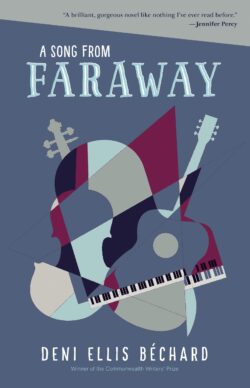#924 Fractured angles & pools of time
A Song from Faraway
by Deni Ellis Béchard
Fredericton: Goose Lane, 2020
$22.95 / 9781773101545
Reviewed by Theo Dombrowski
*
 Novel? Collection of short stories? A Song from Faraway is, in a conventional sense, neither of these. Or both. And this isn’t the only lack of convention in Deni Ellis Béchard’s new book.
Novel? Collection of short stories? A Song from Faraway is, in a conventional sense, neither of these. Or both. And this isn’t the only lack of convention in Deni Ellis Béchard’s new book.
Pieced together like a mosaic, through fractured angles and disparate pools of time, the book seems all the more fragmentary because of the strikingly different writing in each of the six segments. A tour de force of different narrative styles, the book hardly meshes with the views of those who insist writers should find their “own voice.”
Each segment, to boot, swarms with enormous narrative energy, the combination producing the effect of a turbulent flood of violence, volatile relationships, and psychological turmoil. Years pass in half a sentence, national borders and mountain ranges dissolve beneath the pen. Surely self-referential irony lies in the observation Béchard makes about one of his characters: “Through the book, he’d seen the borders of nations and oceans as if observing the planet from the vantage of the moon.” And yet, far from being written through a haze of generalizations, the whole achievement is incised with shards of detail that create the impression not of “novelistic” invention, but of lived experience.

The fact that Béchard wrote these pieces over the course of 20 years and even published them separately explains some of their variation, but only some: the different approaches in each story seem controlled, manoeuvred into achieving an off-centred unity.
To emphasize the diversity is not to say that the stories don’t have a lot in common (and let’s call a spade a spade, and refer to the segments as stories rather than chapters). It is even possible to read the book as a kind of family saga, at least to the degree that by the end, most of the main characters, appearing over several generations, turn out to be connected by family relationships — “turn out to be” because, for many readers, (surely) several of the connections will settle out only after some serious brow furrowing and riffling through hints made in early chapters.
Further, family patterns repeat. For one thing, this seems at many points to be a book about fathers and sons — or, often, unpleasant (deeply unpleasant) fathers and alienated sons. Largely directly towards male experiences, the stories likewise repeatedly reveal abandonment and betrayal, sometimes by fathers, sometimes by husbands. Consistent with these patterns is the fact that, while most relationships are charged with crackling or slow-burning electricity, not a single traditional nuclear family or stable marriage survives the turbulent back-eddies of years.
A spectrum that, at one extreme, reveals individuals and the charged forces cutting through them, at the other extreme reveals the dark landscape of war and social violence. Sometimes active participants, sometimes collateral victims, nearly all of Béchard’s characters are damaged by these conflicts. In the course of a short book, we witness the effects of the historic displacement of the Acadians, the scorched earth attacks of the Boer War, the trench horrors of the First World War, the contortions of power and cruelty in the Mexican Civil War and more: the American war against Indigenous peoples (especially at Wounded Knee), the Tulsa Race Riots (only viewed asquint), the Vietnam War, the attack on the Twin Towers, and the Iraq war.
In contrast to the major chords of these two strong patterns (family relationships and social violence) a minor chord — artistic creation in many different forms — seems especially poignant. Manuscripts of novels, of a screenplay, songs (one called “A Song from Faraway”), a series of mesmeric solo dances, a violin played obsessively, nearly lost for many years, recovered, played, later sold for a guitar — all of these thread through the lives of the troubled characters and seem to say something about the human need for aesthetic expression as a core of meaning, value, and even healing.

The first story is called “Kali Yuga,” a term whose grim implications are levelly explained in the story and, in a sense, permeate the whole book. Though the first story is the least eventful, it is also the most engaging, rich and multi-faceted, coloured by nimble handling of language and tone, varied and sharp observations on everything from popular social trends to personality quirks. Over the course of many years Andrew, a grad student in Vancouver, encounters (no other word will do) his half-brother of the same father. Although Andrew reports regularly on his own comparatively wooden romance, it is these encounters with Hugh (remember the name!) that make the story remarkable. While working slowly on translating a manuscript in Spanish of a book he found in the dead father’s belongings, Hugh disappears and reappears, shape-shifting his personality from Virginia redneck, to going-down-the-road hippy, to pocketbook philosopher/ literary buff, and, suddenly, to career soldier in the U.S. Army.
The writing is wonderful. Sharp, tonally complex, linguistically inventive, it is both unsettling and compelling, and all the more because it is often very, very funny (the only story that is). The butt of the humour can be Hugh: “he belted me with one of his hugs, so popular in the World Wrestling Federation.” It can be cultural fads (the account of a sex therapy class is unforgettable). It can be Andrew himself: trying to speak eloquently about ancient Persians and Gauls, he confesses, “All I could picture was Asterix comic books.” And where it is not funny, it is sharply inventive: “A few furrows had appeared on her forehead like the faint, rudimentary jottings of a protolanguage.” And yet, ultimately, it is strangely melancholy, leaving the reader adrift and contemplative.
After the first story with its disarmingly intimate and scattershot voice, the second might seem a little remote and sober — but clearly Béchard is intent on making a specific effect. Written in the third person, it is more or less embedded in the viewpoint of one Francis Sheridan (another name needing remembering). Francis is but one of Béchard’s young male protagonists alienated from a cold, militaristic father. After a chance encounter with two young Kurds, he agrees to accompany them to their home in Kurdistan to advise them on the value of artifacts they hope to sell — and hence the name of the story, “The Boy and the Lioness,” the label given to a small statue evoking, the protagonist decides, “a blissful union with our warlike nature.” Given what happens in the rest of the book, this interpretation is, at best, ghoulishly ironic. The story becomes increasingly tense as threats deepen, hinging amongst other things, on the U.S. betrayal of its Kurdish allies. The paternal and political forces converge in a harrowing and tonally complex conclusion.
Some readers, or those who are good at this sort of thing, will calculate much later in the book that one of the tiny, glinty ironies that Béchard leaves to the reader to ferret out, is that the protagonist and the military interrogator who appears only incidentally here are, in fact, grandsons of the same deeply awful (military) man.

Like the first two stories, the next two are coupled and introduced with a cover page, this time emphasizing that they embrace five countries and 66 years. In the first, “Song from Faraway,” the author again chooses a third person point of view, but this time infuses the writing with the romanticized rhythms and cadences of a tale of old: “His gut boiled when he thought of his father, that he’d never again walk with him to the docks or be nourished with the rhythm of his fiddle.” In a few pages the story evokes, through its rhythms, the wandering, disturbed, and passionate lifetime of a displaced Acadian boy, Joseph, consumed by his need to play his violin. Years can snag on a single, visionary moment. Of Joseph’s first encounter with a young fisher woman after years at sea, for example, Béchard writes, “Her cotton dress was napped from wear, and he kept his gaze to the newly stitched seam at her shoulder.” So much happens in this story, and so much of it through raw, atmospheric imagery — and, above all, that of the violin — that it leaves much the same impression as a dreamlike animated film.
Apparently realizing that he had to do something consistent with, but different from this story, Béchard couples it with one called “The Glass Ladder.” The link with the first, through a woman called Félicité, is direct but supple. For a short time Joseph’s wife, she is, in this story, “one of the mothers” of an odd and elusive child called Emelisse. Remarkably, this story is written as a kind of a deeply strange, rural-gothic tale, the effect amplified by a choric voice, never identified, modulated with the rumour, gossip and hearsay of others: “Some claimed,” “The boys said,” “If Edgar is to be believed.” The one story with a female protagonist, this one casts Emelisse entirely in shadows. Again, virtually a whole life takes place in a few pages, though framed with an image of the broken Emelisse near the end of her haunted and haunting story, having returned to her village roots from a life manipulated by a ruthless pimp, and broken by drunken soldiers.
The third and final section also floods through many years and many countries. The first story, “Protest Song,” familiarly, is centred on the vulnerable son of a cold, distant — and brutally military — father. Permanently damaged by the shock of his experiences in the trenches of the First World War, Nolan tries over many years to patch together his life. Chance brings him into contact with characters from the previous stories as he struggles for healing through a powerful “shuffling” dance belonging to the very Indigenous people his father helped slaughter at Wounded Knee. The mysterious process is potent to the extent, Béchard writes, that “creating a space with your body can build you into someone new.”
What at first seems a comparatively conventional narrative form in this story suddenly, near the end, is disrupted. The voice that breaks into the narration, we eventually discover, is Nolan’s son — and, thus, the father of the two half-brothers from the first story. It is best to leave to readers the realization of how this son, again reacting to an often remote father, turns to music and writing to find his way: “He imagined his past in order to create the art of his own deliverance.” His novels, about wars, burnings, lynchings, Wounded Knee, include (wait for it) Song From Faraway.
It is in the last story, though, “Killing the Man,” that Béchard seems to take a huge side step from the complexly interrelated family members, by taking the story into the life of a young Mexican, Léon, caught up in the violence of the Mexican civil war. Léon’s discovery of and absorption into the manuscript of a book he finds, The Angels Write Poetry with Blood, however, entangles his life with that of the book’s author, the man who is the conduit — more or less — by which the final incidents in the book connect with its beginning.
With so much at stake, with so many characters and so many family forces working through and on them, expectations for the conclusion of the novel might be high. The book does not conclude with an apotheosis of understanding or a revelation about the interconnected, multi-general family. Neither does it offer a vision of humanity’s grim entanglement with violence and war. Instead, it stops in a single, focused moment of violence.

Béchard gives only the most meagre hint that, nearby and unnoticed by the two main characters, the worst incident in American racial violence, the Tulsa race riot massacre, is taking place. Oblivious of the smoke filling the sky from the distant city, Estrada tells Léon, “Life in America is good.” The aching blindness of the claim and the book’s focus entirely on Léon’s violent reaction to discovering that morally redemptive fiction is just that, fiction, drives the self-referential irony to bleed backwards into the entire book.
It is hard not to feel that this darkness in the final page is an assertion not just about the human condition, but also about the very existence of A Song From Faraway as a piece of fiction. The fact, however, that the writing throughout teams with such creative strength creates the sense that such faith as Léon places in the uplifting book he reads, and thus in writing — in Béchard’s writing — runs deeper than his disillusionment.
*

Born on Vancouver Island, Theo Dombrowski grew up in Port Alberni and studied at the University of Victoria and later in Nova Scotia and London, England. With a doctorate in English literature, he returned to teach at Royal Roads, the University of Victoria, and finally at Lester Pearson College at Metchosin. He also studied painting and drawing at the Banff School of Fine Arts and at UVic. Theo is the author and illustrator of popular guide, travel, and hiking books including Secret Beaches of the Salish Sea (Heritage House, 2012), Seaside Walks of Vancouver Island (Rocky Mountain Books, 2016), Family Walks and Hikes of Vancouver Island — Volume 1: Victoria to Nanaimo, and Volume 2: Nanaimo North to Strathcona Park (RMB, 2018), reviewed by Chris Fink-Jensen in The Ormsby Review. His most recent reviews for Ormsby are of books by Aislinn Hunter, Eva Holland, Anosh Irani, Anne Enright, and Esi Edugyan. Theo has also written a Kindle book, When Baby Boomers Retire, and you can learn more about him here. Theo Dombrowski lives at Nanoose Bay.
*
The Ormsby Review. More Books. More Reviews. More Often.
Publisher and Editor: Richard Mackie
The Ormsby Review is a journal service for in-depth coverage of B.C. books and authors. The Advisory Board consists of Jean Barman, Robin Fisher, Cole Harris, Wade Davis, Hugh Johnston, Patricia Roy, David Stouck, and Graeme Wynn. Scholarly Patron: SFU Graduate Liberal Studies. Honorary Patron: Yosef Wosk. Provincial Government Patron since September 2018: Creative BC
“Only connect.” – E.M. Forster
2 comments on “#924 Fractured angles & pools of time”